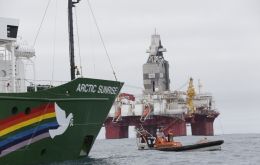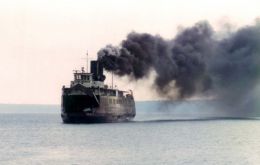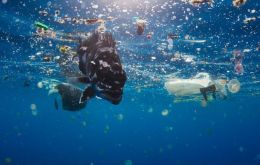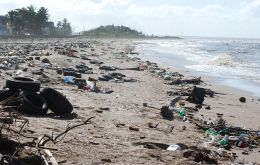MercoPress. South Atlantic News Agency
Environment
-
Wednesday, April 25th 2018 - 09:06 UTC
Tons of frozen micro-plastics found trapped in the floating ice of the Arctic

Record levels of micro-plastics have been found trapped inside sea ice floating in the Arctic. Ice cores gathered across the Arctic Ocean reveal micro-plastics at concentrations two to three times higher than previously recorded. As sea ice melts with climate change, the plastic will be released back into the water, with unknown effects on wildlife, say German scientists.
-
Saturday, April 21st 2018 - 06:57 UTC
What is Earth Day, and what is it meant to accomplish?

A message from Earth Network president, Kathleen Rogers - Close to 48 years ago, on 22 April 1970, millions of people took to the streets to protest the negative impacts of 150 years of industrial development.
-
Thursday, April 19th 2018 - 08:12 UTC
Drilling near the mouth of the Amazon banned by Brazil's environmental regulator

The public prosecutor’s office in the northern state of Amapá recommended on Wednesday that Brazil’s environmental regulator Ibama deny French major Total a license to drill for oil near the mouth of the Amazon.
-
Wednesday, April 18th 2018 - 07:56 UTC
IMF semi-annual report warns of choppy waters ahead: protectionism and trade wars

While the world economy continues to show broad-based momentum, a new report released on Tuesday by the International Monetary Fund (IMF) is warning that there may be choppy seas ahead, caused by increasing protectionism or tit-for-tat trade wars.
-
Monday, April 16th 2018 - 08:53 UTC
Ambitious IMO strategy to reduce shipping emissions 50% bu 2050

Nations meeting at the United Nations International Maritime Organization (IMO) in London have adopted an initial strategy on the reduction of greenhouse gas emissions from ships, setting out a vision to reduce GHG emissions from international shipping and phase them out, as soon as possible in this century.
-
Monday, April 16th 2018 - 08:40 UTC
UK earmarks £61.4 million to fight the rising tide of plastic pollution in oceans

The UK Government has earmarked a £61.4 million war chest to fight the rising tide of plastic pollution in the world’s oceans. Theresa May announced the fund ahead of the Commonwealth Heads of Government meeting in London this week.
-
Friday, April 13th 2018 - 08:44 UTC
New Zealand bans new offshore exploration and targets a clean energy future

Permits for offshore oil and gas exploration will no longer be issued by the New Zealand Government as part of its commitment to a clean energy future. The move will not affect existing permits for exploration or extraction, meaning the industry is likely to continue in the nation for several more decades.
-
Thursday, April 12th 2018 - 08:42 UTC
Global shipping industry discussing in London a cap to emissions

Countries are meeting in an attempt to agree cuts to greenhouse gases from the global shipping industry, amid pressure on the sector to help tackle climate change. Shipping, like aviation, is not directly included in the Paris Agreement, the international deal on global warming which was secured in the French capital in 2015 and commits countries to avoiding “dangerous” climate change.
-
Tuesday, April 10th 2018 - 09:02 UTC
Plastic crisis: divert foreign aid to dumpsites in developing countries

By Christine Cole (*) - Plastic pollution in the oceans is a major problem that is finally getting the attention it deserves, thanks to Blue Plan II. It makes headline news almost every week – and famous figures such as the Pope, Prince Charles, Dame Ellen MacArthur and Sir David Attenborough have all joined the debate.
-
Sunday, April 8th 2018 - 21:16 UTC
What does the new Falklands ‘Islands Plan’ mean for South America?

Over the past decade it is has become customary for a newly elected Legislative Assembly in the Falkland Islands to publish an ‘Islands Plan’. As there are no political parties in the Falkland Islands, all eight members of the Assembly are independents. Therefore there is no collective manifesto when elected to office. This has traditionally been addressed via a consensus-based Islands Plan.
